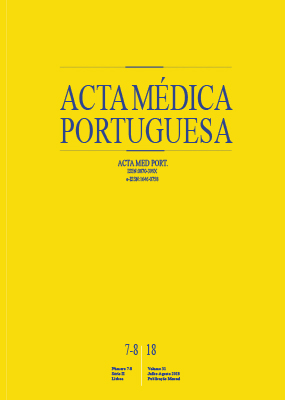Threats to Health and Well-Being Perceived by Older People in Poland and Portugal
DOI:
https://doi.org/10.20344/amp.9613Keywords:
Aged, Aging, Health Status, Poland, PortugalAbstract
Introduction: According to the OECD, Portugal and Poland rank below average in several well-being measures such as income and wealth, and health status. Investigating how people perceive the threats to health in these two countries, is an important issue to address priority needs. To meet this need, the objective of this paper was to compare the perceptions of the threats to the health and well-being among the Polish and Portuguese older persons and explore differences between the countries in respect of patterns of self-rated health.
Material and Methods: A Cross-sectional study with two convenience samples from primary health care services of Poland and Portugal was conducted; 480 adults aged 65 and over (247 Portuguese) were included. The EASYCare standard assessment of 2010 was applied under a joint project of both countries. The association between ‘self-rated unhealthy’ and socio-demographic and threats to health variables was examined using logistic regression.
Results: In both countries about two thirds of the older persons self-rated their health as unhealthy. Having more than enough finances was associated with a significant lower odds of being unhealthy compared with those without enough finances at the end of the month (Portugal: OR = 0.25, 95% CI 0.10 to 0.63; Poland: OR = 0.33, 95% CI 0.12 to 0.88). Visual problems, bodily pain, memory loss, feeling bored or lonely and reporting shortness of breath during normal activities was consistently associated with fair or poor self-rated health.
Discussion: These findings provide important information regarding the health profile of older people which can help in the development of people-centred health systems where their lives and well-being can be improved.
Conclusion: The unhealthy perception of older people was consistently associated with indicators of major health threats.
Downloads
Downloads
Published
How to Cite
Issue
Section
License
All the articles published in the AMP are open access and comply with the requirements of funding agencies or academic institutions. The AMP is governed by the terms of the Creative Commons ‘Attribution – Non-Commercial Use - (CC-BY-NC)’ license, regarding the use by third parties.
It is the author’s responsibility to obtain approval for the reproduction of figures, tables, etc. from other publications.
Upon acceptance of an article for publication, the authors will be asked to complete the ICMJE “Copyright Liability and Copyright Sharing Statement “(http://www.actamedicaportuguesa.com/info/AMP-NormasPublicacao.pdf) and the “Declaration of Potential Conflicts of Interest” (http:// www.icmje.org/conflicts-of-interest). An e-mail will be sent to the corresponding author to acknowledge receipt of the manuscript.
After publication, the authors are authorised to make their articles available in repositories of their institutions of origin, as long as they always mention where they were published and according to the Creative Commons license.









